Who is the blogger?
Video Trailer Collection
Picks from movies shown on TVOntario's Saturday Night at the Movies
It's a Wonderful Life (1946)
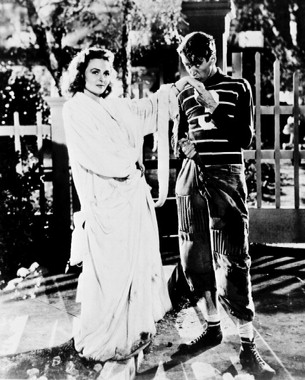 “It’s a Wonderful Life” is the kind of film everyone loves to see (and see again) no matter what time of year it is. It seems like the more things change, the more a film like this stays the same. It provides a kind of film-watchers’ comfort food as we hurtle at breakneck speed through the ensuing decades of personal, societal, and cinematic evolution. Perhaps some of us are not so sure anymore of why exactly we like this movie, how the tradition of watching it got started or if the film is really all that good in the first place. We know that it’s a
“It’s a Wonderful Life” is the kind of film everyone loves to see (and see again) no matter what time of year it is. It seems like the more things change, the more a film like this stays the same. It provides a kind of film-watchers’ comfort food as we hurtle at breakneck speed through the ensuing decades of personal, societal, and cinematic evolution. Perhaps some of us are not so sure anymore of why exactly we like this movie, how the tradition of watching it got started or if the film is really all that good in the first place. We know that it’s a 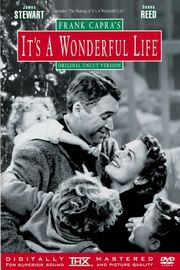 part of a well-worn tradition (like eating fruitcake and turkey giblet gravy at Christmas). For that reason, if for no other, we are bound to see it again some time.
part of a well-worn tradition (like eating fruitcake and turkey giblet gravy at Christmas). For that reason, if for no other, we are bound to see it again some time.
There’s just something terribly likeable about that everyman character, George Bailey (played by Jimmy Stewart). It’s not that he’s all that good looking or extremely clever or exceptionally charming or anything else. He’s just supposed to be an ordinary “nice guy”. In this big old mean old world, even nice guys can have some pretty big problems. At a certain point, George’s charmed life comes crashing in upon him and he finds  himself about to jump off a bridge to put an end to it all. George Bailey wonders out loud if his life has really been worth living. A guardian angel (played by Henry Travers) is immediately dispatched from the heavenly realms in order to put things to rights. With the help of the unearthly messenger, George comes to realize that his life has had a tremendous impact, not only on his immediate family members, but on the whole community.
himself about to jump off a bridge to put an end to it all. George Bailey wonders out loud if his life has really been worth living. A guardian angel (played by Henry Travers) is immediately dispatched from the heavenly realms in order to put things to rights. With the help of the unearthly messenger, George comes to realize that his life has had a tremendous impact, not only on his immediate family members, but on the whole community.
 Wholesome is a good word to describe this film. It’s not a type of picture that you would see made today. Maudlin might be another word employed by some detractors of the film who would have little patience for such a cinematic work. But then, such people might not really appreciate how things work and what exactly goes on around the family dinner table each Christmas at our house. There are just certain dishes that Mother makes for every Christmas dinner (like the orange
Wholesome is a good word to describe this film. It’s not a type of picture that you would see made today. Maudlin might be another word employed by some detractors of the film who would have little patience for such a cinematic work. But then, such people might not really appreciate how things work and what exactly goes on around the family dinner table each Christmas at our house. There are just certain dishes that Mother makes for every Christmas dinner (like the orange 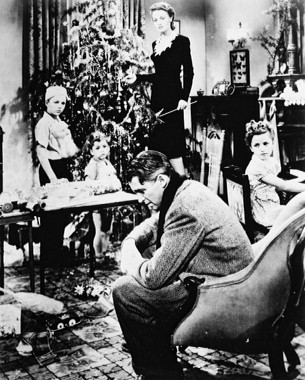 jellied salad or the buttered spicy squash). If you come as a guest for the dinner every year, you know that you are going to have to eat those dishes. It does no good to complain. You might as be reconciled with the traditional menu offering and find the virtues of the said salad. You’ll enjoy things a lot more if you do. And after all, what’s so bad about being good? Milk is wholesome too. It can be quite pleasant if you are used to it. And you would probably miss it if you could
jellied salad or the buttered spicy squash). If you come as a guest for the dinner every year, you know that you are going to have to eat those dishes. It does no good to complain. You might as be reconciled with the traditional menu offering and find the virtues of the said salad. You’ll enjoy things a lot more if you do. And after all, what’s so bad about being good? Milk is wholesome too. It can be quite pleasant if you are used to it. And you would probably miss it if you could 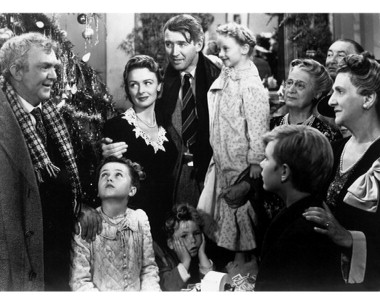 no longer have it. That’s kind of how I feel about “It’s a Wonderful Life”.
no longer have it. That’s kind of how I feel about “It’s a Wonderful Life”.
>>Not so Real Life: Sarah takes a chance on striking out in a new direction. Dealing with disappointments
>>More to see: Looking for more out of life?
See the three minute summary of "It's a Wonderful Life" (1946) Also see the scene where George lassos the moon.
The Shipping News (2001)
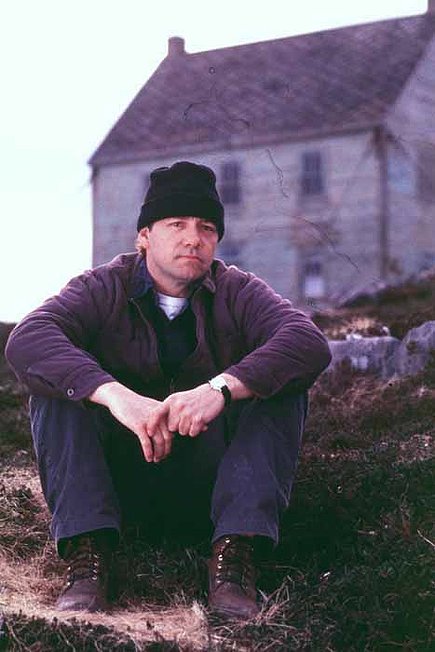 In “The Shipping News” Kevin Spacey plays Quoyle, a long-time loser with a complicated family history who unexpectedly returns to Newfoundland as a desperate act of self-preservation for himself and his family. The ties that
In “The Shipping News” Kevin Spacey plays Quoyle, a long-time loser with a complicated family history who unexpectedly returns to Newfoundland as a desperate act of self-preservation for himself and his family. The ties that 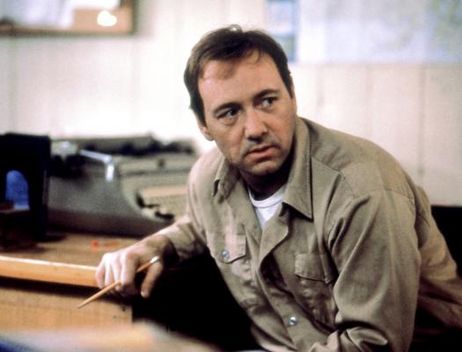 bind are a deep mystery, deeper than the wild blue ocean that itself plays a major role in the film.
bind are a deep mystery, deeper than the wild blue ocean that itself plays a major role in the film.
Along the way, Quoyle meets an wonderful array of “colourful characters” that include Judy Dench playing his convoluted Aunt Agnis, Gordon Pinsent as his unanticipated mentor, Scott Glenn as his second-sighted boss, and Cate Blanchett as his  predatory mate. As he sets about making a new life for himself in rural Newfoundland, Quoyle discovers a new set of interests that he never anticipated. He tries his hand at journalism for the local paper. He goes out on the water in his own boat. He catches up with his daughter’s daycare owner, Wavey Prowse (Julianne Moore), and finds out that she’s even more interesting than her name suggests. Quoyle isn’t especially good at any of these things, but he at least gives it a try, and that’s what it’s all about at this stage of his rather stagnated existence.
predatory mate. As he sets about making a new life for himself in rural Newfoundland, Quoyle discovers a new set of interests that he never anticipated. He tries his hand at journalism for the local paper. He goes out on the water in his own boat. He catches up with his daughter’s daycare owner, Wavey Prowse (Julianne Moore), and finds out that she’s even more interesting than her name suggests. Quoyle isn’t especially good at any of these things, but he at least gives it a try, and that’s what it’s all about at this stage of his rather stagnated existence.
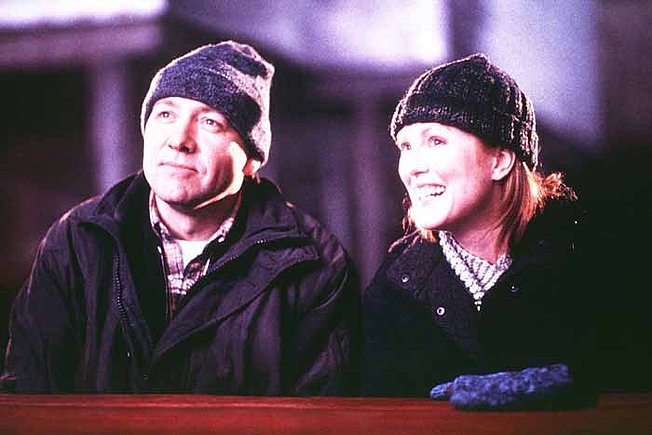 I can’t tell you that the local accents in this film are wonderfully accurate (they’re not). I can’t say whether very many people still use outhouses in Newfoundland or whether anyone has dragged his house across the ice from the outer islands lately. I can’t really recommend the foul tasting Seal Flipper Pie alluded to in the film. (I’ve never had the pleasure.) I don’t know if it’s true that every other inhabitant on the island has run into a moose on the road or had a relative drowned at sea. I don’t know about the second-sight that some claim to have or whether tying mysterious string knots will protect the family or expose them to some terrible other-worldly curse.
I can’t tell you that the local accents in this film are wonderfully accurate (they’re not). I can’t say whether very many people still use outhouses in Newfoundland or whether anyone has dragged his house across the ice from the outer islands lately. I can’t really recommend the foul tasting Seal Flipper Pie alluded to in the film. (I’ve never had the pleasure.) I don’t know if it’s true that every other inhabitant on the island has run into a moose on the road or had a relative drowned at sea. I don’t know about the second-sight that some claim to have or whether tying mysterious string knots will protect the family or expose them to some terrible other-worldly curse. 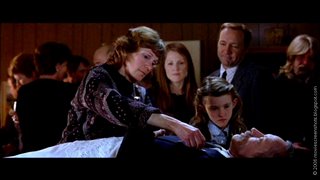 Wake: The Shipping News (credit Moviescreenshots)I’ve never heard of wakes that really wake the dead, but I would not be totally taken aback to see a house chained to the ground for fear of blowing away in a place like Newfoundland. What I do know is that all the displaced Newfoundlanders I’ve ever met were friendly folk with hearty appetites for this life and the next. I trust that the scenery is every bit as dramatic as shown in this film and that the weather is every bit as bad (when it is bad).
Wake: The Shipping News (credit Moviescreenshots)I’ve never heard of wakes that really wake the dead, but I would not be totally taken aback to see a house chained to the ground for fear of blowing away in a place like Newfoundland. What I do know is that all the displaced Newfoundlanders I’ve ever met were friendly folk with hearty appetites for this life and the next. I trust that the scenery is every bit as dramatic as shown in this film and that the weather is every bit as bad (when it is bad).
 Spacey & Dench (credit Moviescreenshots) It’s enough to make one want to run off to Newfoundland (at least for a visit . . . at least for a visit in the summertime.) So much in this film is only half remembered and half spoken. It makes you long for more. I think that this is perhaps one of the primary virtues of the film. It is as evocative as its hauntingly beautiful musical score (see the video below). Maybe the film does not deliver on all levels, but I think it has
Spacey & Dench (credit Moviescreenshots) It’s enough to make one want to run off to Newfoundland (at least for a visit . . . at least for a visit in the summertime.) So much in this film is only half remembered and half spoken. It makes you long for more. I think that this is perhaps one of the primary virtues of the film. It is as evocative as its hauntingly beautiful musical score (see the video below). Maybe the film does not deliver on all levels, but I think it has 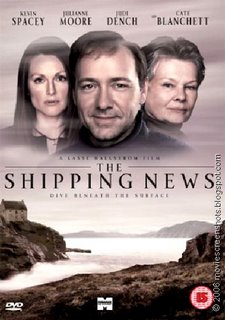 credit: Moviescreenshotsat least this going for it. It opens a window that hints at the “something more” that you can’t quite see from the vantage point of the movie itself. Perhaps the something more is the Pulitzer Prize winning book by Annie Proulx from which the film is derived. Supposedly, the novel is a much better work than the film rendition. Perhaps I should read it some time. Perhaps that would be a more realistic venture than running off to Newfoundland in mid-January on a sight-seeing jaunt.
credit: Moviescreenshotsat least this going for it. It opens a window that hints at the “something more” that you can’t quite see from the vantage point of the movie itself. Perhaps the something more is the Pulitzer Prize winning book by Annie Proulx from which the film is derived. Supposedly, the novel is a much better work than the film rendition. Perhaps I should read it some time. Perhaps that would be a more realistic venture than running off to Newfoundland in mid-January on a sight-seeing jaunt.
See the TVOntario Interviews for The Shipping News(2001): Life Anew. It looks at second chancesand issues of renewal through discussions with actors, directors and screenwriters.
>>More to see: Looking for more out of life?
See the trailer for "The Shipping News" (2001)
Hear part of the magical movie score by Christopher Young.
Places in the Heart (1984)
 In “Places in the Heart” (1984), writer/director Robert Benton delivers a poignant portrait of a way of life as it once was in the deep South during the Depression era. Edna Spalding (played by Sally Field) finds herself in an unexpected place, facing life as a widow with two young children after her husband is suddenly killed. Edna seems to represent many women of her
In “Places in the Heart” (1984), writer/director Robert Benton delivers a poignant portrait of a way of life as it once was in the deep South during the Depression era. Edna Spalding (played by Sally Field) finds herself in an unexpected place, facing life as a widow with two young children after her husband is suddenly killed. Edna seems to represent many women of her 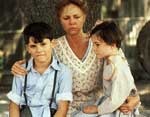 generation. She is ill-prepared to deal with the harsh realities of being a single parent in what is still very much a man’s world. She doesn’t even know how to write out a cheque, much less run a farm and earn a living. Sally Field’s character demonstrates courage, warmth and toughness in the face of overwhelming odds as she attempts to
generation. She is ill-prepared to deal with the harsh realities of being a single parent in what is still very much a man’s world. She doesn’t even know how to write out a cheque, much less run a farm and earn a living. Sally Field’s character demonstrates courage, warmth and toughness in the face of overwhelming odds as she attempts to 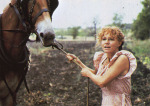 keep her family together during a deep economic and personal crisis.
keep her family together during a deep economic and personal crisis.
Danny Glover’s portrayal of the character Moze, a migrant worker who ends up helping Edna to work the farm and bring in the cotton, captures the essence 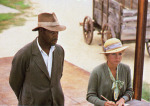 of the situation of the black man in this period of time. Moze searches not only for work to keep body and soul together, but for dignity to make life worth living. He finds both for just a moment with Mizz Spalding on a little farm just outside of the small town of Waxahachie, Texas.
of the situation of the black man in this period of time. Moze searches not only for work to keep body and soul together, but for dignity to make life worth living. He finds both for just a moment with Mizz Spalding on a little farm just outside of the small town of Waxahachie, Texas.
 John Malkovich plays Mr. Will, a complicated character whose injuries from the First Great War involve more than just the loss of his eyesight. As a boarder in the household, Mr. Will temporarily finds a place to belong and a group of people who need him almost as much as he needs to be needed.
John Malkovich plays Mr. Will, a complicated character whose injuries from the First Great War involve more than just the loss of his eyesight. As a boarder in the household, Mr. Will temporarily finds a place to belong and a group of people who need him almost as much as he needs to be needed.
Benton frames his semi-autobiographical work with bookends in the form of two hymns that open and close the film. (See below) These scenes set up a  context for understanding the rest of the action of the film. As with the folksy irregular rhythm of the cotton pickin’ ballads in the middle of the movie, the music comes out of the real life experiences of the townspeople. The music is presented as something that’s a part of what the people here really live. It’s not just an ornamental backdrop for the dramatic action.
context for understanding the rest of the action of the film. As with the folksy irregular rhythm of the cotton pickin’ ballads in the middle of the movie, the music comes out of the real life experiences of the townspeople. The music is presented as something that’s a part of what the people here really live. It’s not just an ornamental backdrop for the dramatic action.
The final scene with the communion in church raises particular issues. Everything else in the film has been firmly anchored in reality until the final frames of the film. Why is it that unreality suddenly takes over? Edna’s dead husband and his killer, the young black man, who was brutally killed by a lynch mob, suddenly appear sitting in church. Sitting there in the pew, they seem as normal as every other member of the community as the communion plate is passed. My thought is that it has to do with what  Robert Benton wants to show us about his main characters and the community they live in. “Places in the Heart” may be a memory of a place and a time that no longer exist. The magic in it is that Benton manages to help us to understand something of what it was like to live there and then, just as he lived it.
Robert Benton wants to show us about his main characters and the community they live in. “Places in the Heart” may be a memory of a place and a time that no longer exist. The magic in it is that Benton manages to help us to understand something of what it was like to live there and then, just as he lived it.
See the TVO Saturday Night at the Movies in depth Interviews as the subject of "Surviving the Depression" is treated in two films shown on SNAM: "Places in the Heart" (1984) and "Pennies from Heaven"(1981).
>>Real Life: Everything in life seemed to be going fine. That all changed the day Tamara learned she had incurable cancer and was faced with only a few uncertain years to live. Where do you turn when confronted with a no-win situation?
>>More to see: Looking for more out of life?
See the framing opening and closing scenes with accompanying music from "Places in the Heart".
Starting Out in the Evening (2007)
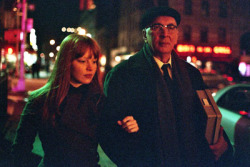 “Starting Out in the Evening” (2007) is actually a film about more than just writers and the craft of writing. It’s about family, career, ambition, following one’s passions, facing death and disappointments . . . and probably a few other things along the way.
“Starting Out in the Evening” (2007) is actually a film about more than just writers and the craft of writing. It’s about family, career, ambition, following one’s passions, facing death and disappointments . . . and probably a few other things along the way.
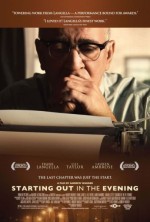 Some may find the film a bit slow and obsessively internally focused. What else can one expect? After all, it’s about the world and the process of being a writer, for goodness sake. (Well, actually, we’re not really too sure for whose sake any of this writing stuff is really for in the end. It seems to me that the film desperately wants to convince us that art for art’s sake is its own reason for being.)
Some may find the film a bit slow and obsessively internally focused. What else can one expect? After all, it’s about the world and the process of being a writer, for goodness sake. (Well, actually, we’re not really too sure for whose sake any of this writing stuff is really for in the end. It seems to me that the film desperately wants to convince us that art for art’s sake is its own reason for being.)
Leonard Schiller has lived the life of a New York intellectual. He now has lots of time to reflect on whether it has all been worth it as he faces the illness and incapacity of old age. He’s been stuck with a bad case of writer’s block for years now. It is high time to face up to the truth: neither he nor the characters of his latest novel are going anywhere. A bright young grad student (Lauren Ambrose) intent on 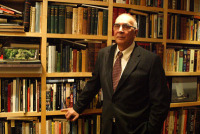 building her own career helps Schiller to realize that he has been following his characters around for years in vain, “waiting for them to do something interesting”. Schiller is faced in the end with a moral dilemma that cuts to the core of his artistic and personal integrity. Does he have the courage to face life the way it really is with its disappointments and limitations and still engage fully in the creative process? Will he do it this time in a wiser, less self-centred way?
building her own career helps Schiller to realize that he has been following his characters around for years in vain, “waiting for them to do something interesting”. Schiller is faced in the end with a moral dilemma that cuts to the core of his artistic and personal integrity. Does he have the courage to face life the way it really is with its disappointments and limitations and still engage fully in the creative process? Will he do it this time in a wiser, less self-centred way?
Schiller’s daughter, Ariel, has a different dilemma. Her life as a former dancer is anchored in a much more physical day-to-day reality, in  contrast to her father’s intellectual pursuits. Ariel has to face her own moral dilemmas and internal wrestlings as she processes what it means to her to be pushing 40 and still be childless. Conflicted desires and yearning for fulfillment bubble up as she faces the mandatory “early retirement” of her dancing career and encounters a former lover who has other priorities in life. (See the video clip.)
contrast to her father’s intellectual pursuits. Ariel has to face her own moral dilemmas and internal wrestlings as she processes what it means to her to be pushing 40 and still be childless. Conflicted desires and yearning for fulfillment bubble up as she faces the mandatory “early retirement” of her dancing career and encounters a former lover who has other priorities in life. (See the video clip.)
Not the film to see if you’re in the mood for an adrenalin rush or up for mindless movie-watching with lots of microwave popcorn on hand . . . It certainly does have its merits though. If you’re not in a rush, why not spend a couple of hours mulling things over with this engaging piece of cinema.
>>More to see: Looking for more out of life?
>>Real Life Story: Successful author, Anne Rice, tells of how the exploration of her personal demons led to writing a series of vampire novels before taking a surprising twist later on in her professional life.
Understand more about "The Written Life" as depicted in SNAM's Interviews about two films which take on the subject of authors and the work of the author. The films described in the Interviews are "Starting Out in the Evening" (2007) and "Infamous" (2006).
See the trailer for "Starting Out in the Evening" (2007)
Georgy Girl (1966)
 Before there was an “Ugly Betty”, there was “Georgy Girl” (1966). The film lights down in London town during those mad 1960s with the crazy new sounds coming out of bands like “The Seekers” and the even crazier new hairdos and mini skirts. We see Georgy girl (Lynn Redgrave) awkwardly sporting one of the new “dos” as the opening credits roll over top of the chart topping
Before there was an “Ugly Betty”, there was “Georgy Girl” (1966). The film lights down in London town during those mad 1960s with the crazy new sounds coming out of bands like “The Seekers” and the even crazier new hairdos and mini skirts. We see Georgy girl (Lynn Redgrave) awkwardly sporting one of the new “dos” as the opening credits roll over top of the chart topping 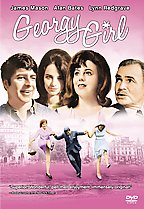 number by the Australian band. (I was surprised to learn that they weren’t a part of the British invasion.) The film is a lot like the title song in that it is a lighthearted romp with surprisingly serious undertones for those who are really listening.
number by the Australian band. (I was surprised to learn that they weren’t a part of the British invasion.) The film is a lot like the title song in that it is a lighthearted romp with surprisingly serious undertones for those who are really listening.
The story line is a bit mixed up, much like Georgy herself. Georgy’s beautiful and free-spirited roommate, Meredith, leaves behind a boyfried and a baby as she gets on with her life after an ever so brief encounter with her own non-maternal nature. Georgy tries to pick up the pieces. After all, there is an adorable, helpless child involved. The make-shift domestic arrangements with Jos, the baby’s father, soon fall apart. A cast-off boyfriend doesn’t really fit any 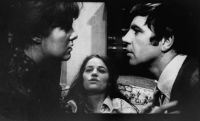 better than the ridiculous coiffure that Georgy tries on in the film’s introduction. In true improvisational style that fits the times and Georgy’s quirky personality, she tries on a completely different set of circumstances by accepting her family’s employer as stand-in dad. James Leamington (played by James Mason) is supposedly Georgy’s better in social standing - although one wonders if he isn’t actually her “worser” after he offers her an albeit “very proper” and attractive contractual arrangement for Georgy to be his mistress. Georgy passes up the offer. She’d like to think she can do better. She changes her mind (like a girl changes clothes) when the offer firms up a bit more and becomes a proposal of marriage after Leamington’s wife conveniently takes herself out of the way by dying.
better than the ridiculous coiffure that Georgy tries on in the film’s introduction. In true improvisational style that fits the times and Georgy’s quirky personality, she tries on a completely different set of circumstances by accepting her family’s employer as stand-in dad. James Leamington (played by James Mason) is supposedly Georgy’s better in social standing - although one wonders if he isn’t actually her “worser” after he offers her an albeit “very proper” and attractive contractual arrangement for Georgy to be his mistress. Georgy passes up the offer. She’d like to think she can do better. She changes her mind (like a girl changes clothes) when the offer firms up a bit more and becomes a proposal of marriage after Leamington’s wife conveniently takes herself out of the way by dying.
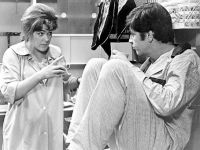 In the end, it is a marriage of convenience that Georgy chooses as her best fit in the era of the sexual revolution. It is perhaps the best option afforded to someone like Georgy “who just missed being beautiful”. One wonders how well this arrangement is going to work out over time, as we watch the closing scene where the new bride repeatedly caresses her adopted infant. She seems oblivious to the groom sitting next to her in the get away car. It may well end up as just another failed experiment to be washed away down the drain along with the hair pins and mascara of Georgy’s “new look” in the opening scene.
In the end, it is a marriage of convenience that Georgy chooses as her best fit in the era of the sexual revolution. It is perhaps the best option afforded to someone like Georgy “who just missed being beautiful”. One wonders how well this arrangement is going to work out over time, as we watch the closing scene where the new bride repeatedly caresses her adopted infant. She seems oblivious to the groom sitting next to her in the get away car. It may well end up as just another failed experiment to be washed away down the drain along with the hair pins and mascara of Georgy’s “new look” in the opening scene.
Georgy’s pick of the best offer out of a limited range of options appears to be missing something: unconditional commitment and acceptance of people for who they really are. It’s what Georgy really wants; it’s what all of us want in the end –free love.
Don’t miss the SNAM Interviews on the subject of “Beauty -and Other Myths”. The Interviews deal extensively with another movie with a parallel theme shown in conjunction with “Georgy Girl” The second feature was “Dogfight”.
>>Real Life: Michelle participated in “The Biggest Loser” contest in order to lose weight. She found unexpected healing that led to a more permanent change in her life.
>>More to see: Looking for more out of life?
See the TVO video trailer for "Georgy Girl" (1966)




